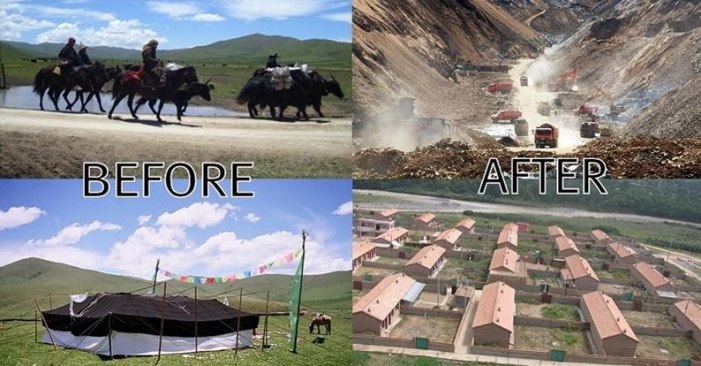Source: Freetibet.org
China is trying to destroy the traditional way of life for Tibetan nomads.
Nomads are being forced off the land and moved into urban settlements
Traditional farming methods are being replaced
The UN says China’s agricultural policy is scientifically-flawed
Tibetan nomads face poverty, unemployment and social exclusion as their way of life is ripped from their hands

TRADITIONAL TIBETAN LIFE
Raising yaks and other livestock has been a way of life in Tibet for centuries.
Nomadic herders range across the Tibetan plateau, using their intimate knowledge of the landscape to find the best grazing for their animals and sustain their families and communities.
Since the early 1990s, China has sought to destroy this way of life.
It has moved more than two million Tibetans from the land they have lived off for generations to barrack-like urban settlements. Torn from all they know, nomads face poverty, unemployment and social exclusion.
PROTECTING THE ENVIRONMENT
China has justified its policy – known as ‘tuimu huancao’ – by claiming grasslands must be protected from overgrazing.
But traditional Tibetan farming techniques have protected the grasslands for hundreds of years. Independent experts have shown that China’s policies are scientifically unjustified.
Once vacated by nomads, Tibetan land is open for exploitation by Chinese companies.
Tibet is rich in natural resources, including gold, copper and water (for hydro-electric power).
Mining companies and damming operations have replaced farmers in many areas.
Tibetans frequently protest against the consequences of mining and environmental destruction, often leading to a violent response from security forces (see video).
DECEPTION
Many nomads, poorly educated and unable to give properly informed consent, are persuaded to give up their land rights through deception, threats and bribery.
Tibetans who voice their concerns about any Chinese policies through peaceful protest can be arrested, imprisoned and even killed by security forces – just like Norpa Yonten, a 49 year old herder who was killed during a mass shooting in January 2012.
POVERTY AND SOCIAL EXCLUSION
Relocated families can be forced to pay three-quarters or more of the cost of their new, lower quality housing. This forces Tibetans into debt making them unable to feed their livestock or families.
Robbed of their traditional livelihood, nomads rarely have the skills to make a living in an urban setting. Unable to compete with Chinese-literate urban Tibetans or Han-Chinese immigrants, they are hopelessly outmatched in their homeland’s job market.
Economically marginalised, nomads may be treated as criminal outcasts and blamed for thievery and other social problems
CHINA’S ‘SERIOUS POLICY FAILURE’
Free Tibet raised these issues with the United Nations’ Special Rapporteur for Food in 2010. After visiting the country, he agreed with Free Tibet’s findings, which stated that the “serious policy failure” had left nomads “landless, without means of subsistence, [and] untrained in modern skills essential for entry into the modern workforce.”
He also observed that “while climate change is most probably the main driver of environmental changes […], mining is another driver of land degradation in some areas”.




 Print
Print Email
Email